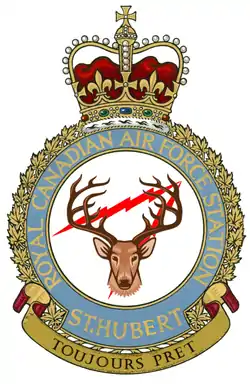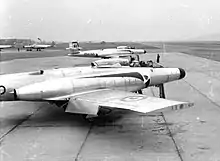CFB St. Hubert
Canadian Forces Base St. Hubert was a Canadian Forces Base in the city of Saint-Hubert, Quebec. The base began as a civilian airfield in the 1920s and was later also used by RCAF auxiliary (reserve) squadrons beginning in the mid 1930s. It became a fully-fledged RCAF station early in WW2 being extensively used for training as part of the British Commonwealth Air Training Plan. After the war, it grew into and remained for decades, one of the most important air bases in Canada.
| CFB St. Hubert | |
|---|---|
| Montréal/Saint-Hubert Airport in Canada | |
 Crest of RCAF Station St-Hubert (pre 1969) | |
 CFB St. Hubert | |
| Coordinates | 45°30′58.54″N 73°25′14.77″W |
| Type | Airbase |
| Site information | |
| Owner | Department of National Defence |
| Operator | Canadian Armed Forces |
| Garrison information | |
| Occupants | Current: 438 Sqn RCAF 34 Service Battalion 5 MP platoon 34 Canadian Brigade Group HQ Past: 13 SFTS RCAF 115 Sqn RCAF 118 Sqn RCAF 401 Sqn RCAF 410 Sqn RCAF 416 Sqn RCAF 423 Sqn RCAF 425 Sqn RCAF 426 Sqn RCAF 429 Sqn RCAF 450 Sqn RCAF EWU RCAF Air Defence Command HQ Mobile Command HQ 712 Communication Squadron |
In its heyday as an operational air force station, it was host to multiple jet fighter squadrons flying the de Havilland Vampire and later the CF 100 in all-weather fighter squadrons, and two Royal Canadian Air Force Reserve Sabre squadrons, 2 multi engine transport squadrons in addition to being the host station to RCAF Air Defence Command Headquarters. It became part of CFB Montreal upon the unification of the Canadian Forces in 1968 with the HQ now serving as the Mobile Command Headquarters. The main base was decommissioned by the Canadian Forces in the mid 1990s being downsized to a garrison under the administrative control of CFB Montreal. 438 Tactical Helicopter Squadron operates from the former base's airfield.[1]
History
World War II


RCAF Station St Hubert[2][3] was a Royal Canadian Air Force (RCAF) airbase established in World War II at the Montréal/Saint-Hubert Airport. The station was home to the British Commonwealth Air Training Plan No. 13 Service Flying Training School (13 SFTS) from 1 September 1941 to February 1944 when it moved to North Battleford, Saskatchewan. It had a relief field located at Farnham, Quebec. It operated the North American Harvard and the Avro Anson as advanced training aircraft. In 1942 the aerodrome was listed as RCAF Aerodrome - St.Hubert, Province of Quebec at 45°31′N 73°26′W with a variation of 16 degrees west and elevation of 87 ft (27 m). Three runways were listed as follows:[4]
| Runway name | Length | Width | Surface |
|---|---|---|---|
| 6/24 | 4,840 ft (1,480 m) | 150 ft (46 m) | Hard Surfaced |
| 10/28 | 2,840 ft (870 m) | 150 ft (46 m) | Hard Surfaced |
| 1/19 | 3,630 ft (1,110 m) | 150 ft (46 m) | Hard Surfaced |
Postwar
As early as 1946, RCAF squadrons previously disbanded overseas the year before following the end of hostilities, were being reformed in Canada. Both regular and auxiliary units were reactivated in St-Hubert. 410 Sqn, a regular RCAF unit on the new British designed Vampire jet fighter, and 401 and 438 (Aux) squadrons flying the Harvard and then also converting to Vampires.
In its heyday as an operational air force station, it was host to multiple jet fighter squadrons flying the de Havilland Vampire and later the CF 100 in all-weather fighter squadrons, and two Royal Canadian Air Force Reserve Sabre squadrons, 2 multi engine transport squadrons in addition to being the host station to RCAF Air Defence Command Headquarters. It became part of CFB Montreal upon the unification of the Canadian Forces in 1968 with the HQ now serving as the Mobile Command Headquarters. The main base was decommissioned by the Canadian Forces in the mid 1990s being downsized as a garrison.
Post decommissioning
The airport remains in use as Montréal/Saint-Hubert Airport.
Operations
A Canadian Forces garrison remains at the airport, including 438 Tactical Helicopter Squadron and 34 Service Battalion.
No longer using the runways, 438 Squadron has separate helipads located next to a hangar on rue Leckie.
New army recruits in the Primary Reserve often take their BMQ (Basic Military Qualification) course under the supervision of 34 Service Battalion at this location.
References
- "438 Tactical Helicopter Squadron official website". Archived from the original on 2010-12-06. Retrieved 2011-04-23.
- Hatch, F. J. (1983). The Aerodrome of Democracy: Canada and the British Commonwealth Air Training Plan, 1939-1945 (PDF). Ottawa: Directorate of History, Department of National Defence. p. 203. ISBN 0-660-11443-7.
- Military Bruce Historical Writings by Bruce Forsyth
- Staff writer (c. 1942). Pilots Handbook of Aerodromes and Seaplane Bases Vol. 1. Royal Canadian Air Force. p. 76.